
Did you know that the field of natural language processing began in the 1940s (after World War II)? Even at that time, people accepted the importance of language translation from one language to another. They even hoped to create a machine that could do this sort of translation.
Fast forward to today, and with the advent of Siri, Alexa, and Google Assistant, it's evident that we have achieved significant milestones in this endeavour. Behind these devices’s ability to understand, interpret, and respond to our spoken and written words lies a remarkable technology: Natural Language Processing (NLP).
NLP is a branch of AI that enables these digital companions to understand and respond to human language, making tasks easier, interactions more intuitive, and our connection with technology more seamless than ever before. In this blog, we'll discover how NLP empowers virtual assistants to bridge the gap between human communication and artificial intelligence.

How Does Natural Language Processing Work?
Natural Language Processing (NLP) is a field of artificial intelligence that focuses on enabling computers to understand, interpret, and generate human language. In simple words, it extracts the meaning by breaking the language into words, deriving context from words and structuring data to convert it into usable insights for a business.
Stats suggest that the worldwide revenue from the natural language processing (NLP) market is predicted to be almost 14 times larger in 2025 than it was in 2017, increasing from around three billion U.S. dollars in 2017 to over 43 billion in 2025.
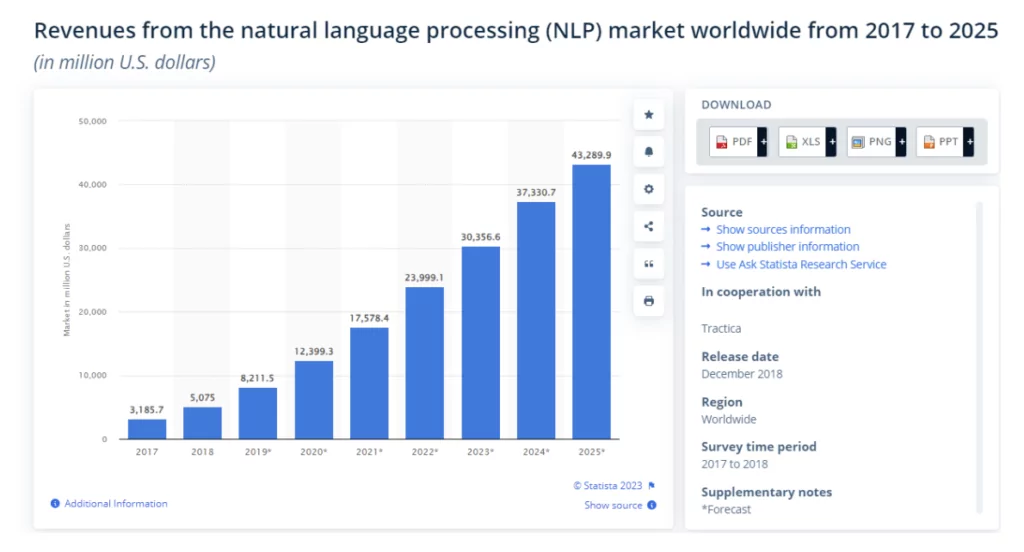
To understand how NLP works, let’s go through the key steps:
- Text Input: NLP starts with textual data as input, which can include documents, emails, tweets, or any form of written or spoken language.
- Tokenization: Next, the text is broken down into smaller units, typically words or subwords, known as tokens. This step helps maximizing data for analysis.
- Parsing and Syntax Analysis: Following the NLP analysis, the grammatical structure of sentences to understand relationships between words and phrases is done. This involves tasks like part-of-speech tagging and dependency parsing.
- Semantics: After this NLP aims to seize the meaning of words and sentences by considering context and associations. It uses techniques like word embeddings and semantic role labelling to help in this regard.
- Named Entity Recognition: it’s time to identify entities such as names, dates, and locations within the text to help in extracting relevant information.
Why NLP Is Vital for Virtual Assistants
NLP is crucial for virtual assistants like Amazon's Alexa since it helps in speech recognition, identifies users' intent and analyzes the text to extract key information, entities, and context using techniques like Named Entity Recognition.
Based on the understood intent, Alexa generates a relevant response and performs actions. Now let’s get into the nitty-gritty details of why NLP helps VAs to function at their best:
1. Conversational Abilities: NLP uses machine learning to analyze language patterns, semantics, and context, enabling virtual assistants to comprehend and reply to user queries naturally.
For example, retail giant Walmart uses NLP chatbots for customer support, offering real-time assistance, product recommendations, and order tracking through natural language conversations, enhancing customer engagement and satisfaction.
This makes interactions more intuitive and user-friendly, resembling human conversations.
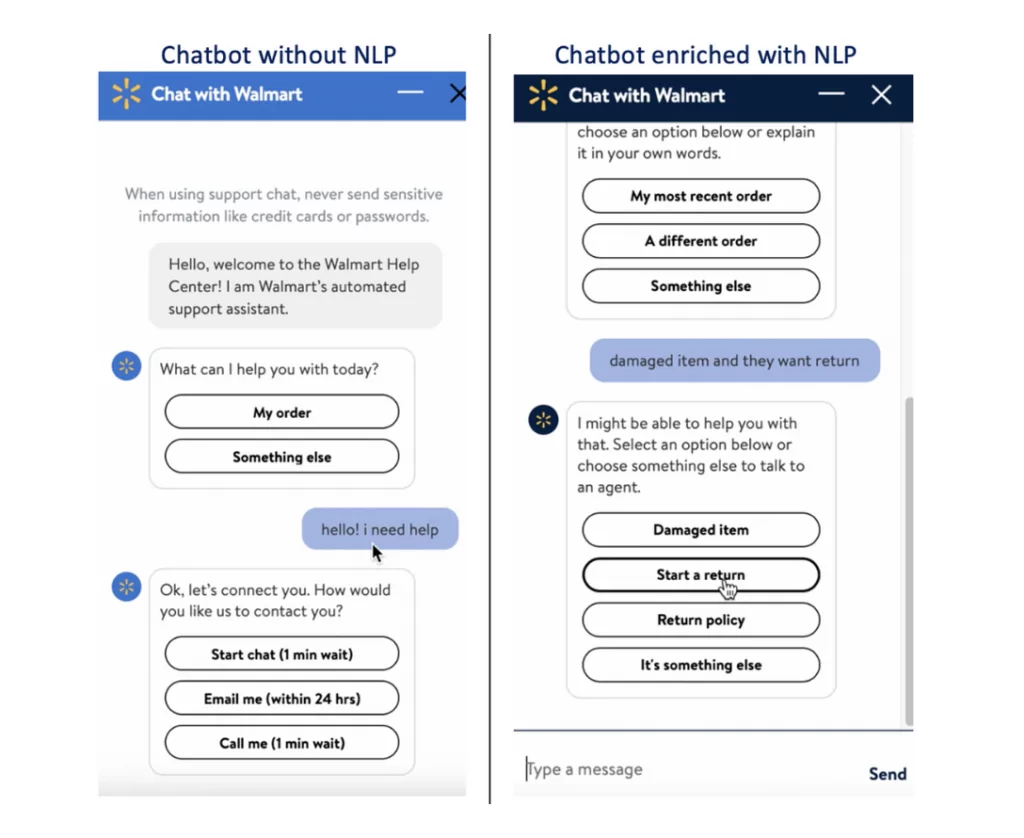
2. User Engagement: Did you know that 70% of consumers are willing to pay more for a convenient experience? That being said, NLP learns from user interactions, continually improving its recommendations.
For example: Nike's AI-powered StyleBot leverages NLP to enhance user engagement by providing personalized fashion advice and product recommendations. As a result, Nike users feel understood, valued, and more engaged, ultimately leading to increased customer satisfaction and loyalty.
3. Multilingual Support: NLP facilitates multilingual communication just like a business phone, allowing virtual assistants to serve a global audience by understanding and responding in various languages.
WhatsApp, a global messaging app, employs NLP for multilingual support. It auto-detects and translates messages in different languages, facilitating seamless communication between users worldwide.
NLP also breaks down language barriers, making interactions more inclusive, and enabling efficient cross-cultural conversations. This feature demonstrates the brand's commitment to enhancing user experiences and ensuring effective communication across diverse linguistic backgrounds.
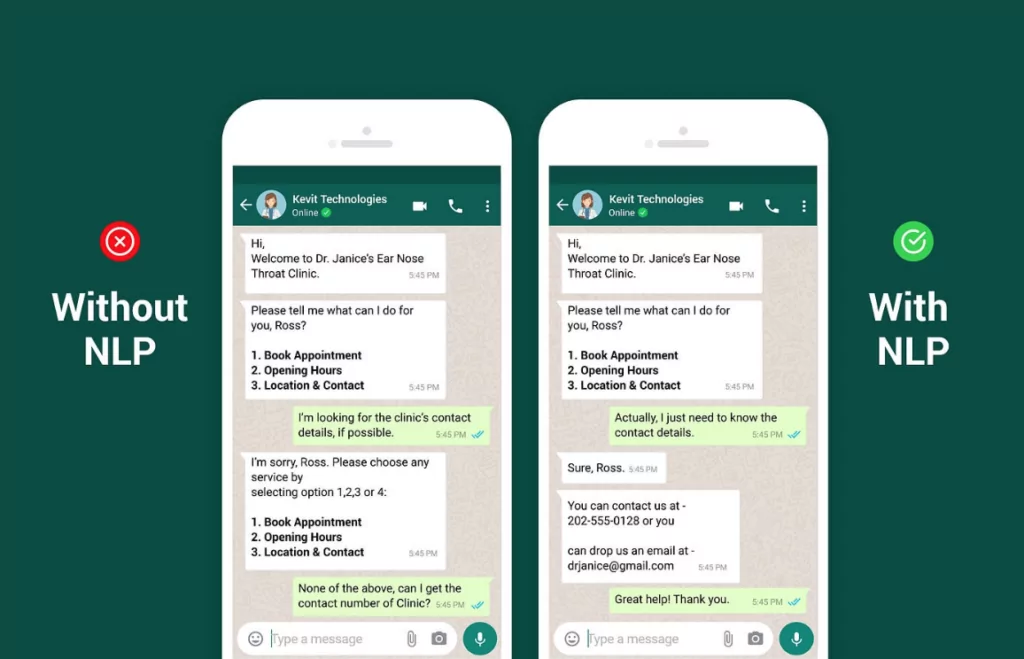
4. Task Automation: Statistics show that NLP virtual assistants can resolve customer queries around 70% of the time. This can reduce the burden for your customer support team since now you can automate these queries and solve them at the same time.
NLP helps VA to understand complex instructions, enabling them to perform tasks like setting reminders, sending emails, or controlling smart home devices through voice commands.
For example: IBM Watson offers NLP-powered automation solutions to businesses. It assists in automating tasks such as data extraction, document processing, and customer support inquiries by analyzing and extracting relevant information from unstructured text.
5. Information Retrieval: NLP enables virtual assistants to search, summarize, and retrieve information from vast datasets or the internet, making them valuable for research, information gathering, and fact-checking.
For instance, Google uses NLP for information retrieval, refining search results by understanding user intent and context. It enhances user engagement by providing more accurate and relevant information quickly, improving the overall search experience.
NLP in Virtual Assistant Applications
To start with, by 2023, according to a Gartner study, 30% of customer service organizations will deliver customer services by using AI-powered algorithms and continuous intelligence.
For instance, Apple's Siri employs NLP to understand and respond to voice commands, making devices more user-friendly and efficient. Siri's NLP enables tasks like setting reminders, sending messages, and accessing information through natural language interactions, simplifying users' lives.
Moreover, Google Assistant leverages NLP to provide personalized recommendations and search results. By understanding user preferences and context, it tailors responses, significantly enhancing the user experience and keeping users engaged.
In customer service, chatbots from brands like Zendesk and Intercom utilize NLP to handle inquiries more efficiently. They understand and respond to customer messages, reducing response times and increasing customer satisfaction.
Companies like consumer cellular which is a mobile virtual network operator uses NLP to optimize the network and help in predictive maintenance.
Overall, NLP in virtual assistants enhances user engagement and streamlines processes across various industries, simplifying tasks, personalizing interactions, and driving efficiency, ultimately benefiting both brands and users.
How NLP Improves User Engagement
Natural Language Processing (NLP) significantly enhances user engagement across various platforms and industries. Whether you want to remind your consumers that it’s time to refinance mortgage or improve customer engagement in your retail shop, NLP serves you completely :
1. Chatbots in Customer Service: NLP-powered chatbots like Alexa offer personalized and human-like interactions, resolving customer queries efficiently. Users engage more as they find assistance readily available, leading to higher customer satisfaction.
2. Social Media and Content Recommendations: NLP analyzes user preferences and behavior to suggest tailored content. By recommending shows and movies aligned with a user's taste, Netflix keeps users engaged, reducing churn and increasing viewing hours.
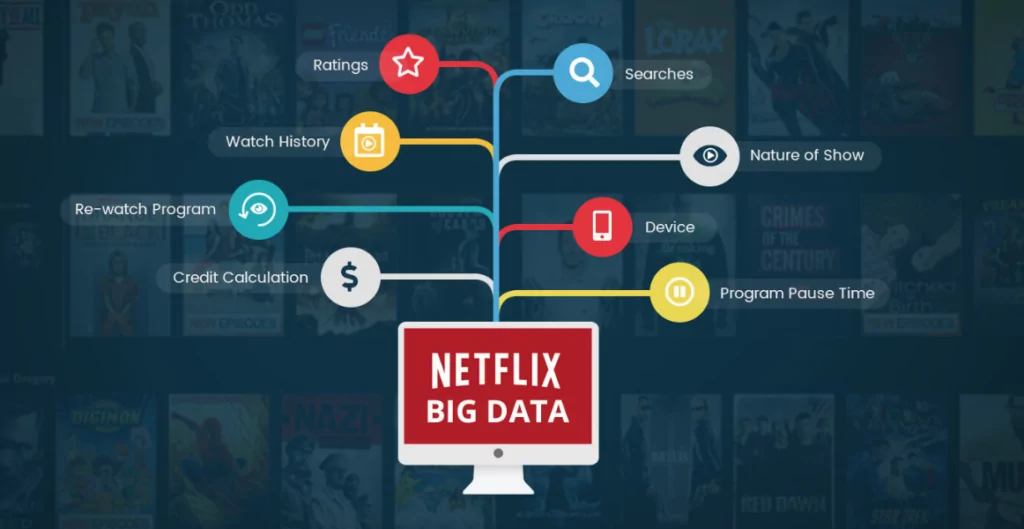
3. E-commerce and Virtual Shopping Assistants: Virtual shopping assistants using NLP help users find products by understanding natural language queries. Whether you you're in search of a comfortable mattress from Amerisleep or looking for something eco-friendly on ebay, NLP empowers VAs to give you excellent service. For example ebay, they offer product recommendations and facilitate a conversational shopping experience, increasing user engagement and purchase rates.
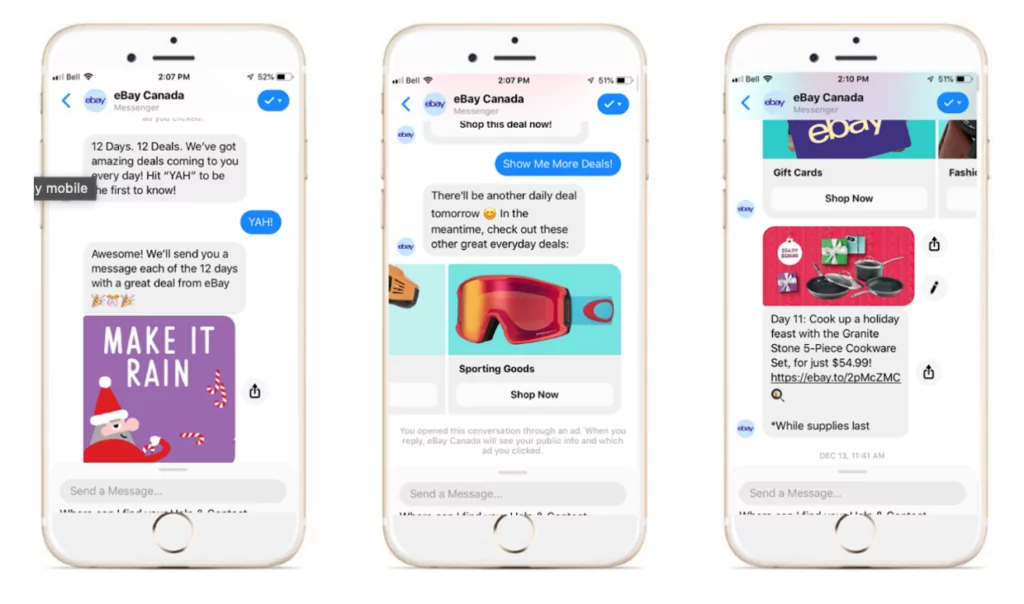
To sum it up, NLP improves user engagement by:
- Enabling conversational interactions that feel more natural.
- Providing personalized responses and recommendations based on user behaviour and preferences.
- Enhancing accessibility and inclusivity by understanding and responding to diverse user needs.
- Streamlining information retrieval, making it quicker and more user-friendly.
What are the Challenges in NLP for Virtual Assistants
Just like every coin has two sides, so does (NLP) virtual assistant. It comes with its own set of challenges. Virtual assistants face several challenges that impact their effectiveness and usability. Here are some of the main challenges:
- Understanding Context: Virtual assistants struggle to understand nuanced context, making it challenging to maintain coherent conversations, especially in complex or lengthy interactions.
- Multilingual Support: Handling multiple languages, dialects, and accents poses difficulties. Achieving high accuracy in understanding and responding to diverse linguistic inputs remains a challenge.
- Ambiguity: Ambiguous phrases or homonyms can confuse virtual assistants. NLP systems often struggle to discern the correct meaning based on the surrounding context.
- Privacy Concerns: Collecting and processing user data for NLP raises privacy issues. Striking a balance between personalization and privacy protection is a significant challenge.

Conclusion
To conclude, NLP enables virtual assistants to understand our words, context, and even emotions, facilitating seamless communication through speech or text. They assist us in myriad ways, from setting reminders and answering questions to controlling smart homes and providing valuable recommendations. To explore more about NLP and stay updated on the latest innovations, join our newsletter today. Embrace the future of human-computer interaction with NLP-powered virtual assistants – your intelligent companions in this digital age.

